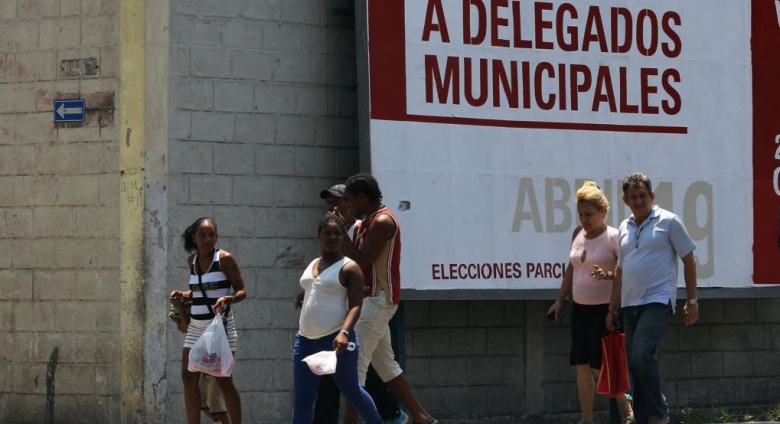
Dimas Castellanos, 7 September 2017 — The Cuban electoral system includes general elections every five years for deputies to the National Assembly of People’s Power and delegates to provincial elections, as well as partial elections every two and a half years for district delegates and municipal assemblies.
During this month the nomination of candidates corresponding to a new election period will take place and on Sunday October 22 municipal elections will be held, a process that will culminate in February of 2018 with the designation of the new National Assembly and the election of the next revolutionary Government. (Ed. note: Due to Hurricane Irma the election calendar was extended after this article was written.)
Article five of the Constitution defines the Cuban Communist Party (PCC) as “the leading force of society and the state,” therefore, the electoral system is designed to ensure the continuity of the PCC in power. This explains that although in the districts the people nominate and directly elect delegates, in forming the municipal, provincial and national assemblies, which is where the true power is concentrated, the Candidature Commissions, made up of the leaders of the mass organizations — constitutionally subordinated to the PCC — have the power to name 50% of the candidates, even if they have not been elected by the people.
In a context characterized by economic decline, the latent danger of the end of the subsidies from Venezuela, widespread lack of interest, moral corruption due to the need to survive and growing despair, the “elections” announced will be, in addition to the most difficult, the last under the current electoral system which, exhausted, will have to give way to a new electoral law. The reasons on which this thesis is based are the following:
In 1959: 1- The revolutionaries who came to power in 1959 were legitimized by arms; 2 – The economy that they found allowed them to lower prices and redistribute wealth, which allowed them to gain popular support; and 3 – Without any economic results, in the middle of the Cold War, they were sustained by Soviet-Venezuelan subsidies.
The current crisis of the electoral system — a reflection of the crisis of the Cuban model — is not ignored by the government. On February 23, 2015, at the 10th Plenum of the PCC Central Committee, it was announced that a new law would be adopted for the general elections of 2018. However, the setbacks suffered by the “Bolivarian” left in the region, the loss of the Parliament for Chavismo in Venezuela and the tight victory [for the government candidate] in the second round in Ecuador seem to have led to the postponement of the new law. To this is added that, in the municipal elections of April 2015 the number of Cubans who did not vote at all or who canceled their ballots totalled 1,700,000 Cubans, or 20% of the electorate.
To this complexity are added: 1- The presentation of dozens independent candidates, which despite their not representing an immediate danger for the conservation of power, is a sign of the need for changes and 2- The recent restrictive measures against private work.
The recent Resolution No. 22/2017 of the Ministry of Labor and Social Security prohibits the granting of new licenses for dozens of self-employment activities ranging from the rental of housing to the pushcart vendors selling agricultural products; activities that the State has been and is unable to carry out. It is, therefore, a setback aimed at preventing the development of an independent national middle class that Cuba needs so much in order to maintain its power.
All this has generated great concern for the Cuban authorities as evidenced by the following three facts:
- The Granma newspaper of Thursday, July 13, 2017 reproduced the following words of Carlos Rafael Miranda Martínez, national coordinator of the Committees for the Defense of the Revolution (the block watch committees that are “the eyes and ears of the Revolution”), calling for a great battle. He said: “This time they must be on the front line to ensure the success of the Cuban electoral process, the great battle is to nominate colleagues and comrades with a proven revolutionary prestige, with a trajectory in favor of the neighborhood and community.”
- The Cuban president, at the closing of the National Assembly, on July 14, 2017, said: “It is not idle to emphasize the transcendent political importance of this electoral process, which must constitute an act of revolutionary reaffirmation on the part of our people, which requires an arduous work of all the organizations and institutions.”.
- The Committees for the Defense of the Revolution initiated the “Neighborhood discussions for the patriotic and anti-imperialist duty,” in which a bulletin of that association is discussed with the directions that its members arrive at the nomination assemblies ready.
For the reasons listed, the new generation of revolutionaries who will take over the leadership of the government in February 2018: (1) that has not been legitimized by arms or by the ballot box; (2) that will find a stagnant economy, in a frank retreat, that prevents them from having anything to offer the people; (3) in an international context without a foreign power prepared to subsidize them for ideological reasons; and (4) amid widespread weariness and discontent that will inexorably lead to a new electoral law.
